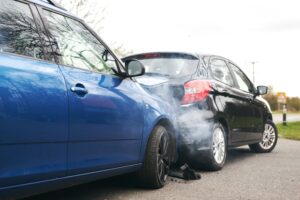If you're reading this because you or a loved one has suffered injuries in a rear-end collision due to someone else's carelessness, know that you're not alone. Thousands of Americans face this harrowing experience each year, and many struggle in the aftermath with physical pain, emotional trauma, and financial hardships. You need to understand what to do if a car hits you from behind to protect your health and legal rights as well as your future. Read on to learn more about the steps you need to take following a rear end collision to hold the at-fault driver accountable and recover damages. For specific advice and guidance regarding your situation, reach out to an experienced car accident attorney near you for a free consultation. They can answer your questions, evaluate your claim, and help you get the full compensation and justice you deserve.
Understanding Rear-End Collisions
 Rear-end collisions are among the most common types of car accidents that occur. They typically result from negligent or aggressive driving behaviors, such as:
Rear-end collisions are among the most common types of car accidents that occur. They typically result from negligent or aggressive driving behaviors, such as:
- Distracted driving
- Tailgating
- Sudden stops
Immediate Steps You Should Take After the Collision
The moments immediately following a rear-end collision can be chaotic and disorienting. However, you must take certain actions immediately following a rear end crash to protect your health and your right to pursue compensation. Your top priority is your safety and the safety of your loved ones and passengers. If anyone sustained serious injuries, call 911 and request emergency services. Paramedics can assess any injuries, some of which may not be immediately apparent due to shock or adrenaline. Regardless of how serious the crash, you need to call 911 and report the accident to the police. They will document the scene and create an official report. You need to obtain a copy of the police report when it’s available and share it with your attorney. A lawyer can also get a copy of the report for you if necessary. Likewise, you need to get a medical evaluation regardless of how minor your injuries seem.Gather Information at the Scene
Once you've ensured everyone's safety and called for help, you need to gather important information for your insurance claim and any potential legal action. Many people overlook this step in the confusion following a crash, but it can make a significant difference in the strength of your case.- Get the name, contact information, and insurance details of the other driver(s) involved. Be sure to note the make, model, and license plate number of all vehicles involved.
- If there were any witnesses to the accident, try to get their names and contact information. Their accounts could be invaluable in supporting your version of events.
- Use your smartphone or another camera to document the accident scene. Take pictures of all vehicle damage, the position of the cars, any skid marks, and the overall accident scene. Be sure to get pictures of your injuries as well. These visual records can provide crucial evidence for your claim.
Seek Medical Attention
As mentioned, you need to get a medical exam as soon as possible after a rear end crash, even if you feel fine. The adrenaline rush from the accident can mask pain and symptoms, and some injuries may not manifest immediately. Here's why getting a prompt medical evaluation is so important:- Some injuries, particularly those affecting the neck and spine, may worsen if left untreated. Early diagnosis and treatment can prevent long-term complications and support your recovery.
- Whiplash is one of the most frequent injuries in rear-end accidents, but you might also experience back injuries, head trauma, or airbag-related injuries. A medical professional can identify these issues, even if they're not immediately apparent to you.
- Medical records serve as vital evidence in your claim. They establish a clear link between the accident and your injuries, which you need to seek compensation.
Report the Accident
If law enforcement didn't come to the accident scene, file a report at the nearest police station or appropriate law enforcement office. You need an official account of the accident to protect your rights and initiate the claims process. When reporting the accident, stick to the facts. Avoid speculating about fault or downplaying your injuries. These initial reports can significantly impact your claim, so be thorough and accurate. You also need to contact your insurance provider as soon as possible to report the accident. Many policies require prompt notification and cooperation with their investigation.Preserve Evidence
To build a strong claim for you, your attorney needs evidence to support it. Here are some things you can do to help your attorney devise a compelling case for you:- Keep all accident-related documents: Save every piece of paperwork related to the accident, including the police report, insurance correspondence, and medical bills. Organize these documents in a dedicated folder for easy access.
- Maintain a record of medical treatments: Keep a detailed log of all medical appointments, treatments, and medications related to your accident injuries. This record will help show the extent of your injuries and the care required.
- Save damaged personal items: If the accident damaged any personal belongings, such as clothing or electronics, keep these items as evidence of the impact.
Understanding Liability in Rear-End Collisions
When it comes to rear-end collisions, determining liability might seem straightforward at first. The reality, though, can be more complex. In most rear-end collisions, people presume the rear driver is at fault. People base their presumptions on the principle that drivers need to pay attention and not follow other vehicles too closely. However, there are exceptions. For instance, if the front driver suddenly reversed, was driving with broken tail lights, or made an abrupt stop without cause, they might share some or all of the liability. If you were the rear driver in a rear end accident, don’t assume you bear full responsibility. Various factors can contribute to an accident, and a thorough investigation may reveal shared responsibility or even full liability of the other driver. Conversely, if it’s clear a negligent driver slammed into you from behind and they or their insurer is trying to somehow blame you for the crash, talk to a lawyer immediately.Potential Compensation You Could Receive
If another driver caused a rear end collision that hurt you or someone you love, an attorney could help you get various forms of compensation for your injuries and losses. These include- Past, current, and future medical expenses
- Lost income, tips, bonuses, and commissions
- Property damages
- Other out-of-pocket expenses related to the accident
- Emotional distress
- Scarring and disfigurement
- Loss of enjoyment of life
- Loss of consortium (in cases of severe injury affecting relationships)
- The severity of your injuries and losses
- The impact on your daily life and ability to work
- The strength of evidence supporting your claim
- The insurance policy limits involved
Dealing with Insurance Companies
After a rear-end collision, you'll likely need to interact with insurance companies - both your own and the other driver's. While insurance adjusters may seem friendly, you must remember that their primary goal is to minimize the company's payout. Insurance companies may offer a quick settlement, especially if your injuries seem severe. While this might be tempting, especially if you're facing mounting medical bills, early settlement offers are often lower than what your claim is truly worth. Once you accept a settlement, you can go back and try to get additional compensation later. Don't accept any offers without understanding the full extent of your injuries and losses. Additionally, be cautious when giving statements to insurance representatives. Insurance adjusters may ask for a recorded statement about the accident. Be aware that they could use anything you say to reduce or deny your claim. When dealing with insurance companies, you have the right to seek legal advice before making any decisions. An attorney can help you understand the true value of your claim and negotiate with the insurance company on your behalf.When to Consult a Personal Injury Attorney
You need to consult a personal injury attorney as soon as possible after getting treatment for your car accident injuries. An experienced car accident attorney can:- Investigate the accident thoroughly
- Gather and preserve crucial evidence
- Handle all communication with insurance companies
- Accurately calculate the full value of your claim
- Negotiate for a fair settlement
- Take your case to trial if necessary
- You've suffered significant injuries
- There's dispute over who was at fault
- The insurance company is offering a low settlement or denying your claim
- You're unsure about the value of your claim
- The accident involved a commercial vehicle or multiple parties
Statute of Limitations
 Another important aspect of pursuing a claim after a rear-end collision is your state’s statute of limitations for personal injury claims. For example, in Texas, you generally have two years from the date of the accident to file a personal injury lawsuit in civil court. However, there can be exceptions that shorten or extend this timeframe. If you miss the deadline and don’t have an attorney file suit for you within that time, you risk losing your right to seek compensation altogether.
While two years might seem like a long time, building a strong case takes time. Evidence can disappear, witnesses' memories can fade, and your attorney may not be able to prove your case. It's best to start the process as soon as possible after your accident.
Even if you're not sure about pursuing legal action, you should consult a lawyer anyway so that you understand your options and don’t miss important deadlines.
Another important aspect of pursuing a claim after a rear-end collision is your state’s statute of limitations for personal injury claims. For example, in Texas, you generally have two years from the date of the accident to file a personal injury lawsuit in civil court. However, there can be exceptions that shorten or extend this timeframe. If you miss the deadline and don’t have an attorney file suit for you within that time, you risk losing your right to seek compensation altogether.
While two years might seem like a long time, building a strong case takes time. Evidence can disappear, witnesses' memories can fade, and your attorney may not be able to prove your case. It's best to start the process as soon as possible after your accident.
Even if you're not sure about pursuing legal action, you should consult a lawyer anyway so that you understand your options and don’t miss important deadlines.
